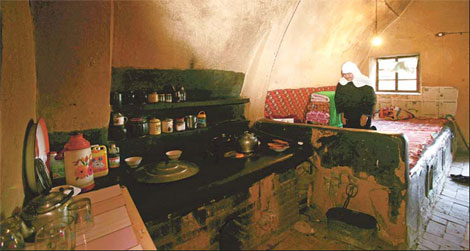Home in the Great Wall
"At first, they were mostly neighbors," Yang says. "The bricks are thick and solid. Who wouldn't want construction materials like that for free? Then people started offering high prices to buy the bricks."
He recalls that at the height of the rush for Great Wall memorabilia in the 1980s people would offer 1 yuan ($15 cents) a brick, when the average monthly income for a family in the area was between 30 and 50 yuan.
 |
|
A devout Muslim, Yang's mother says her prayers, one of five times a day, in their cave house. |
"My father drove all of them away," Yang says.
Yang senior even turned down the offer of a spacious flat in the town center.
"It is much more comfortable living in a flat than in a traditional cave house without modern conveniences," Yang says. "But my father said he was worried about the bricks being stolen if he left. He couldn't let go of the Wall."
Though Yang's siblings moved on, when his father passed on in 1998, it was his dying request that Yang stay and keep an eye on the Wall.
Yang married Li Yonghong in 2000 and though she wanted to move into a modern apartment, he and his mother, now in her 70s, insisted on staying on.
Fortunately his two daughters have learnt to appreciate the beauty of living in the Great Wall and enjoy being called "Great wall princesses" by visitors.
But the craving for Great Wall bricks has not abated.
Yang's "stubbornness" has made his family alienated from their neighbors. Some simply slam their door in his face when Yang tries to reason with them.
"Sometimes I do feel lonely living in the cave house and I owe my family a comfortable dwelling. But I know the Wall would soon be peeled off its bricks."
The family relies on Yang as its only bread earner. He does odd jobs and cannot travel too far to find jobs. "I have to keep checking on the Wall from time to time."
He also paints big characters on the Wall, bao hu chang cheng, ren ren you ze, which means everybody should protect the Wall.
 0
0 







Go to Forum >>0 Comments